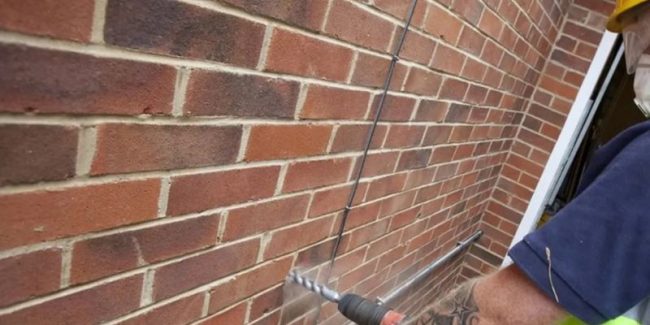In Ireland, heating bills can be one of the biggest expenses for homeowners, especially during the cold and wet winters. Many homes across the country are losing heat every day without their owners even realising it. One of the most effective ways to reduce this heat loss and save money is through cavity insulation.
Whether you live in Dublin, Cork, Galway, or anywhere in between, cavity wall insulation can make your home warmer, more energy-efficient, and cheaper to run. In this article, we’ll explore how cavity insulation works, the benefits for Irish homes, costs involved, and how to get help with grants.
Why Cavity Insulation Matters in Ireland

Ireland’s climate is known for being damp, windy, and cold for much of the year. This makes proper home insulation even more important than in many other countries. Without insulation in your cavity walls, heat from your radiators or stove can easily escape through the walls and into the air outside.
This means you’re paying more to heat your home, and you’re still not getting the comfort you deserve. Cavity insulation acts like a blanket around your home, helping to keep the heat in and the cold out.
For Irish homes, especially those built between the 1920s and 1990s, cavity wall insulation can make a noticeable difference in warmth and energy savings.
Benefits of Cavity Insulation
1. Lower Heating Bills
By reducing the amount of heat lost through your walls, cavity insulation helps you use less energy to heat your home. Most homeowners in Ireland who install cavity insulation report significant savings on their energy bills—sometimes hundreds of euros per year.
2. More Comfortable Home
No one enjoys cold spots or draughts in their house. Cavity wall insulation helps to keep the indoor temperature stable, making your home warmer in winter and cooler in summer.
3. Better Energy Rating
Improving your home’s energy efficiency can boost your Building Energy Rating (BER). This is especially important if you’re thinking of selling or renting your home. A better BER can increase property value and make your home more attractive to buyers or tenants.
4. Environmental Benefits
When you use less energy to heat your home, you reduce your carbon footprint. For those who care about the environment, cavity insulation is a simple but effective step toward a greener lifestyle.
5. Quick Installation
Cavity insulation is a relatively quick and non-invasive job. Most installations can be completed in just a few hours, and there’s usually very little disruption to your home.
Is Your Home Suitable?
Not all homes in Ireland are suitable for cavity wall insulation, but many are. Generally, houses built with cavity walls (typically post-1920s) are ideal. Older homes with solid walls may need a different insulation approach.
Before installing, a professional insulation contractor will carry out a survey to check things like:
-
The width of the cavity
-
The condition of the walls
-
Any signs of moisture or damp
-
Whether insulation has already been installed
It’s essential to work with a SEAI-registered contractor in Ireland to ensure the work is done properly and to qualify for any available grants.
Grants and Financial Support in Ireland
The Sustainable Energy Authority of Ireland (SEAI) offers grants to help homeowners improve their energy efficiency, including cavity wall insulation. This is great news if you’re concerned about the upfront cost.
As of 2025, SEAI grants can cover a significant portion of the cost, depending on your home type and the measures you choose. Grants are available for:
-
Detached houses
-
Semi-detached and terraced homes
-
Apartments (in some cases)
To apply for a grant, you’ll need to:
-
Choose a SEAI-approved contractor.
-
Have your contractor complete the work.
-
Submit proof to SEAI for payment.
In some situations, free energy upgrades are available for people on certain social welfare payments. This could include pensioners or those receiving long-term unemployment support.
How Much Does Cavity Insulation Cost?

The cost of cavity wall insulation in Ireland depends on the size of your home and the type of walls you have. On average:
-
For a standard 3-bed semi-detached home: €700 – €1,000
-
For larger detached homes: €1,000 – €1,600
-
For smaller homes or apartments: €500 – €800
With SEAI grants, your out-of-pocket cost can be much lower—sometimes reduced by several hundred euro.
Keep in mind that this is a one-time investment that continues to save you money every year on heating bills.
Choosing the Right Insulation Company
To make sure the job is done right, always choose a registered and experienced insulation contractor. In Ireland, SEAI provides a list of approved installers who meet quality standards.
When choosing a contractor, ask about:
-
Their experience with homes like yours
-
How long the installation will take
-
Warranty and aftercare services
-
Their grant application process
It’s also a good idea to check reviews or ask neighbours who’ve had insulation work done.
Conclusion
Cavity insulation in Ireland is one of the smartest ways to make your home more energy-efficient, comfortable, and affordable to heat. With the climate we live in, every bit of warmth counts.
Whether you’re living in a city apartment or a country bungalow, don’t let your hard-earned money escape through your walls. Cavity insulation is a fast, cost-effective solution backed by government support.
If you’re ready to take the next step, speak to a local SEAI-approved contractor today and see how much you can save. Your home—and your wallet—will thank you.

